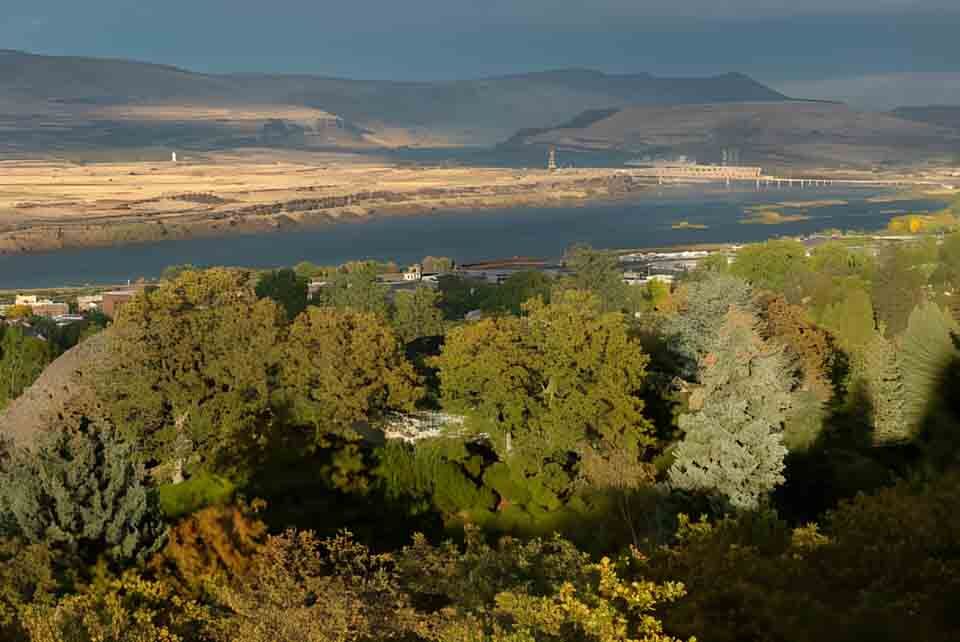Biden Administration Brokered Salmon Restoration Plan Inked By Tribal Leaders, Kotek And Inslee

Governor of Oregon, Tina Kotek, Washington Governor Jay Inslee, and leaders of Columbia River Basin tribes commemorated the launch of a $1 billion plan on Friday as they signed the plan- announced in December, that will help depleted salmon populations in the Pacific Northwest recover. The plan is formally known as the Columbia Basin Restoration Initiative.
Approximately the size of Texas, the Columbia River Basin- once the greatest salmon-producing river system globally used to contain at least 16 stocks of salmon and steelhead. Of these, 4 are now extinct and 7 are protected by the Endangered Species Act. The main cause of the salmon’s decline is seen as the basin’s dams.
Breaching the eastern Washington section of the Snake River dams would be the best hope for recovering the fish, according to federal fisheries scientists. This will give the fish access to hundreds of miles of spawning grounds in a pristine habitat in Idaho.
Over two decades ago, conservation groups sued the federal government to save the fish. Arguing that the continued operation of the dams violates the Endangered Species Act, the groups also highlighted that the dams violate mid-19th century treaties that underpin the tribes’ right to harvest fish.
Dam Breaching To Restore Salmon Stocks
Notwithstanding that some environmental groups and tribal leaders have called for the removal of four controversial dams on the Snake River, the plan stops short of this. According to officials, it would boost clean energy, offsetting hydroelectric power, transportation, and other benefits that are currently provided by the dams, if Congress ever agrees to breaching the dams.
Related: Yurok Tribe Celebrates The Return Of Salmon To The Klamath Basin
Brokered by the Biden administration, the plan interrupts the long-running litigation over federal dam operations and is the most significant step yet towards taking the four Snake River dams down eventually. The White House said that by strengthening tribal clean energy projects, the plan will also deliver other benefits to tribes and other communities that depend on the Columbia Basin for energy, agriculture, transportation, and recreation.
At the White House ceremony, Corinne Sams of the Confederated Tribes of the Umatilla Indian Reservation saw this signing as historic and said, “My heart is big today.”
Jonathan W. Smith- the chairman of the Confederated Tribes of the Warm Springs Reservation said that the agreement deserves to be celebrated as it takes the interests of all stakeholders in the Columbia Basin into account. By laying out a path that will restore salmon and steelhead to healthy and abundant levels, the plan moves the essential green energy transition forward, but in an equitable and socially just way.
Gerald Lewis, Yakama Nation Chairman, said that the strength of the Yakama Nation and its people comes from the Columbia River, though its fish, game, roots, and berries that the river has nourished since time immemorial. He confirmed that the Columbia Basin salmon are dying from the effect of human development.
Related: Klamath Reservoir Drawdown Completion Sparks Water Quality Debate
While the Yakama nation’s fishers have empty nets, their homes have empty tables. Lewis was one of four tribal leaders who spoke at the hour-long ceremony at the White House and felt that historically the federal government has not done enough to mitigate the effects. He noted, “We need a lot more clean energy, but we need to do development in a way that is socially just.”
Proposed Snake River Dam Breaches Faces Opposition
The initiative is opposed by Republicans who were not at the White House on Friday. They have vowed to block the plan, indicating that the dams along the Columbia-Snake River system provide over 1/3 of all hydroelectric power capacity in the U.S., according to the chair of the House Energy and Commerce Committee, Rep. Cathy McMorris Rodgers. It also provides 70% of electricity consumed in Washington state, helping transform Eastern Washington into one of the most productive agricultural regions in the world.
Related: Loss Of Copco Lake Leaves Some Residents Reeling
McMorris Rodgers denounced what she called secret negotiations that were led by John Podesta, White House senior adviser and climate envoy. She said that Biden officials ignored the concerns of people living in the Pacific Northwest and confirmed that they would be significantly affected if these dams were breached.
The Chairwoman of the White House Council on Environmental Quality, Brenda Mallory said, “President Biden understands that the Columbia River is the lifeblood of the Pacific Northwest, for its culture, economy and people.”
